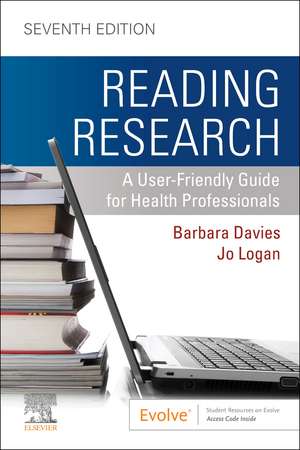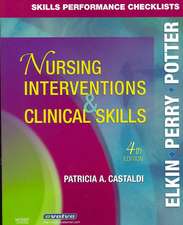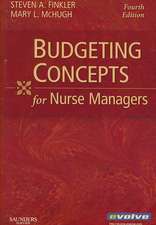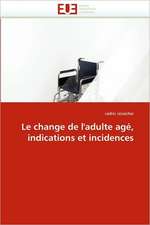Reading Research: A User-Friendly Guide for Health Professionals
Autor Barbara Davies, Jo Loganen Limba Engleză Paperback – 20 iul 2021
Preț: 76.95 lei
Preț vechi: 104.63 lei
-26% Nou
Puncte Express: 115
Preț estimativ în valută:
14.73€ • 15.32$ • 12.34£
14.73€ • 15.32$ • 12.34£
Carte disponibilă
Livrare economică 13-27 februarie
Livrare express 06-12 februarie pentru 37.75 lei
Preluare comenzi: 021 569.72.76
Specificații
ISBN-13: 9780323759243
ISBN-10: 0323759246
Pagini: 96
Ilustrații: 3 illustrations
Dimensiuni: 152 x 229 x 9 mm
Greutate: 0.14 kg
Ediția:7
Editura: Elsevier
ISBN-10: 0323759246
Pagini: 96
Ilustrații: 3 illustrations
Dimensiuni: 152 x 229 x 9 mm
Greutate: 0.14 kg
Ediția:7
Editura: Elsevier
Cuprins
1 Introduction
Why Read Research Articles?
Some Friendly Advice About Reading Research Articles
Check Out the Reader's Companion Worksheets
2 Easy Steps for Reading Research
Title Abstract
Introduction
Theory Issues
Methods
Design
Part 1: Qualitative Design Methods
Rigour in Qualitative Studies
Sample and Setting
Data Collection
Data Analysis and Results
Part 2: Quantitative Design Methods
Experimental Designs
Non-Experimental Designs
Rigour in Quantitative Studies
Sample
Data Collection
How to Judge the Rigour of a Data Collection Tool
Sensitivity and Specificity
Data Analysis and Results
Descriptive Statistics
Inferential Statistics
Part 3: Mixed Methods Research
Mixed Methods Study Characteristics
Mixed Methods Data Collection and Analysis
Results and Discussion
A Final Suggestion: The Acknowledgements
3 Finding Interesting Research Results
Where and How to Start
Define Your Clinical Question
Steps in Constructing a PICO Chart
Search a Database for Relevant Research
Search Terms
How Far Back Should You Search?
Review Articles
How to Read the Fictional Forest Plot Depicting a Meta-Analysis
Appraising Reviews
Searching the Internet for Research Articles
Peer Review
A Cautionary Note About Predatory or Fake Journals on the Internet
How Will I Know If a Journal Is Fake?
Why Should I Be Concerned If the Paper Is Published in a Predatory Journal
Web Portals
Other Types of Databases
Keeping Up to Date
Social Media: Facebook
4 Using Research Results
Research Utilization
The Questions to Ask
Clinical Practice Guidelines
Appraisal of Guidelines for Research and Evaluation
Practice Guideline Websites
The Decision to Use Research Results
Gathering Support and Resources
Want to Learn More?
Bibliography
Glossary
Journals That Publish Peer-Reviewed Research
Worksheets
1. Qualitative Research: The Reader's Companion Worksheet
2. Quantitative Research: The Reader's Companion Worksheet
3. Mixed Methods Research: The Reader's Companion
Worksheet
4. Systematic Reviews: The Reader's Companion Worksheet
5. Using Research Results: The Reader's Companion
Worksheet
Why Read Research Articles?
Some Friendly Advice About Reading Research Articles
Check Out the Reader's Companion Worksheets
2 Easy Steps for Reading Research
Title Abstract
Introduction
Theory Issues
Methods
Design
Part 1: Qualitative Design Methods
Rigour in Qualitative Studies
Sample and Setting
Data Collection
Data Analysis and Results
Part 2: Quantitative Design Methods
Experimental Designs
Non-Experimental Designs
Rigour in Quantitative Studies
Sample
Data Collection
How to Judge the Rigour of a Data Collection Tool
Sensitivity and Specificity
Data Analysis and Results
Descriptive Statistics
Inferential Statistics
Part 3: Mixed Methods Research
Mixed Methods Study Characteristics
Mixed Methods Data Collection and Analysis
Results and Discussion
A Final Suggestion: The Acknowledgements
3 Finding Interesting Research Results
Where and How to Start
Define Your Clinical Question
Steps in Constructing a PICO Chart
Search a Database for Relevant Research
Search Terms
How Far Back Should You Search?
Review Articles
How to Read the Fictional Forest Plot Depicting a Meta-Analysis
Appraising Reviews
Searching the Internet for Research Articles
Peer Review
A Cautionary Note About Predatory or Fake Journals on the Internet
How Will I Know If a Journal Is Fake?
Why Should I Be Concerned If the Paper Is Published in a Predatory Journal
Web Portals
Other Types of Databases
Keeping Up to Date
Social Media: Facebook
4 Using Research Results
Research Utilization
The Questions to Ask
Clinical Practice Guidelines
Appraisal of Guidelines for Research and Evaluation
Practice Guideline Websites
The Decision to Use Research Results
Gathering Support and Resources
Want to Learn More?
Bibliography
Glossary
Journals That Publish Peer-Reviewed Research
Worksheets
1. Qualitative Research: The Reader's Companion Worksheet
2. Quantitative Research: The Reader's Companion Worksheet
3. Mixed Methods Research: The Reader's Companion
Worksheet
4. Systematic Reviews: The Reader's Companion Worksheet
5. Using Research Results: The Reader's Companion
Worksheet


















